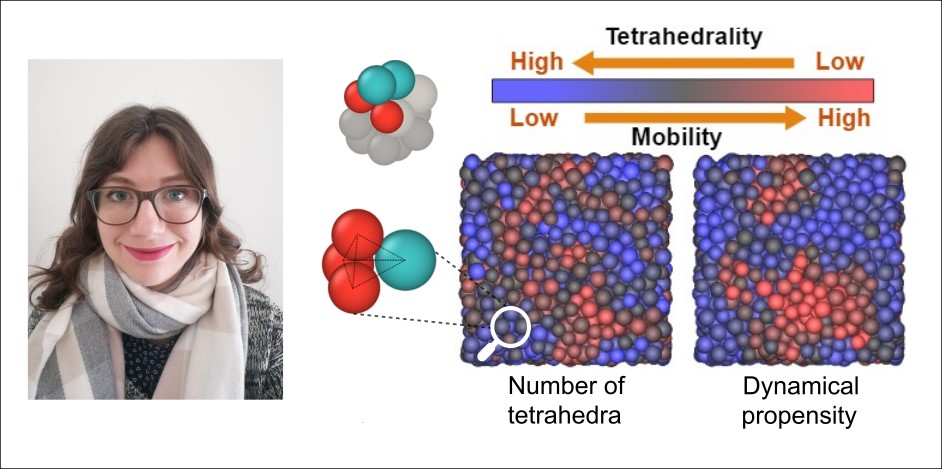Glasses are ubiquitous materials present in our daily life. They originate from the dynamical arrest of a fluid. If a fluid is cooled down or compressed sufficiently rapidly, it avoids crystallization and its dynamics sharply slow down. As a result, the relaxation time, which is a measure of how long it takes a system to flow, sharply increases. Interestingly, the global structure of the fluid do not change as nearly as drastically as the dynamics. In fact, if we compare the structure of a system in the supercooled liquid regime and a dense liquid it would be incredibly difficult to identify which one is which.
However, in recent years several studies point out that some changes in the local structure appear in the fluid as it heads towards the glass phase. This opens the door to several questions: what are these structures? Are they related or are they responsible of the changes on dynamics? Can we learn something about dynamics by just characterizing the structure of a glassy system?

These are some of the questions that have been explored in the PhD thesis from Susana Marin Aguilar, who has been recently awarded with the Saint-Gobain prize 2020 edition, given by the French Physical Society (SFP). The thesis was done in the Laboratoire Physique des Solides (LPS) under the supervision of Giuseppe Foffi, Frank Smallenburg and Rik Wensink.
In her thesis, Susana investigated the interplay between the local structure and dynamics through molecular dynamics simulations of some colloidal glass-former models: from patchy particles to hard spheres.
In particular, by simulating a wide variety of hard-sphere mixtures, they found out that the global and the local dynamics of these systems can be precisely predicted by quantifying the tetrahedrality of the local structure: an order parameter that consist of counting the number of tetrahedra each particle participates in. The accuracy of this parameter is maintained over a wide variety of densities proving its universal behavior in this family of glass-formers.
With this information in mind, Susana continued her work using an unsupervised machine learning method that can autonomously find variations in the local structure of these systems. Interestingly, these structural variations are extremely strongly correlated with the future dynamics of particles. As a result, these methods offer a new way to unravel the relationship between local geometry and dynamics in disordered systems. This last part of the work was done in collaboration with Emanuele Boattini and Laura Filion at Utrecht University, and Saheli Mitra at LPS.
References:
- Marín-Aguilar S., Wensink H. H., Foffi G., and Smallenburg F., Slowing down supercooled liquids by manipulating their local structure, Soft Matter, 15, 9886-9893, (2019).
- Marín-Aguilar S., Wensink H. H., Foffi G., and Smallenburg F., Rotational and translational dynamics in dense fluids of patchy particles, J. Chem. Phys., 152, 084501, (2020).
- Marín-Aguilar S., Wensink H. H., Foffi G., and Smallenburg F., Tetrahedrality dictates dynamics in hard sphere mixtures, Phys. Rev. Lett., 124, 208005, (2020).
- Boattini E., Marín-Aguilar S., Mitra S., Foffi G., Smallenburg F. and Filion L., Autonomously revealing hidden local structures in supercooled liquids, Nat. Commun. 11, (2020).
- Marín-Aguilar S. Smallenburg F., Sciortino F. and Foffi G., Monodisperse patchy particle glass former, J. Chem. Phys., 154, 174501, (2021).
Contact : Susana Marín Aguilar
